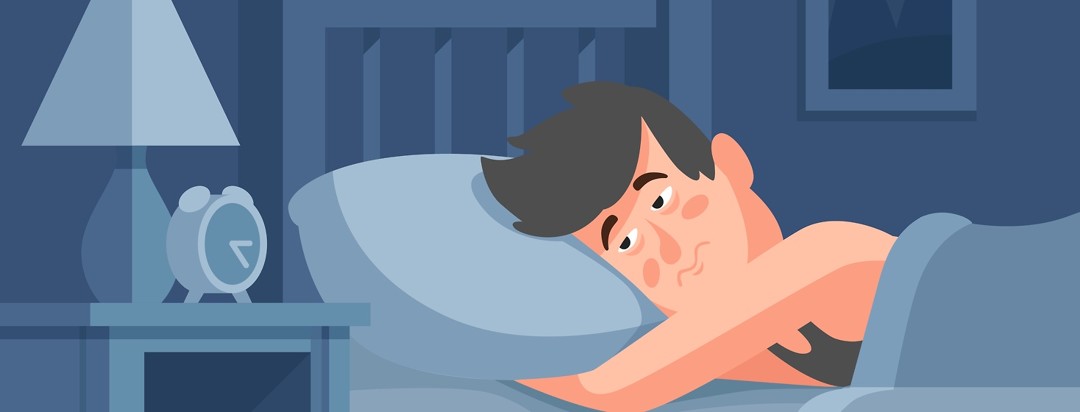A Sleep Hygiene Primer: Place, Time, and Behavior
While having cancer can make it difficult to sleep, practicing sleep hygiene can give you some control over your nighttime ZZZ. Last time, we talked about daily habits and their impact on sleep. This week, we’ll look at place, time, and behaviors that we can correct for better sleep.
Environmental factors
Your sleeping space should be designated only for sleep so you’ll actually snooze. Removing clocks, televisions, computers, and other electronics helps. Also, strive for comfort by:
- Ensuring you have a comfortable mattress, pillow, and bedding.
- Removing clutter to achieve a sense of sanctuary in this space.
- Prevent children and pets from entering the room and disrupting sleep.
- Keep room temperature even: A too-warm or too-cool room disrupts sleep architecture. Try layering blankets for easy adding and subtracting.
- Keep your bedroom dark. Room darkening shades or sleep masks can solve the problem of streetlight illumination in urban and suburban environments.
- Keep your room quiet. Mask interior and exterior noise using white noise or soft music, creating a pleasant background the brain can anchor to. Use earplugs. If your partner snores, ask them to move to another room to avoid disrupting your sleep.
- Consider air quality. Your bedroom should be devoid of airborne mold, mildew, cigarette smoke, or microorganisms. Launder dirty clothes and bedding. Occasionally open the windows to air out the space; this can improve air quality, especially in winter.
Timing considerations
Your circadian rhythms rely on timing that matches the Earth’s day-night cycles. Disrupted circadian rhythms are especially problematic for people with cancer.
One way to support your rhythms is to go to bed and rise at the same time every day and night. The body also takes cues from digestion and physical activity to inform its circadian system. Try eating and exercising no later than two hours before bedtime.
Bedtime rituals
What you do before bed affects sleep quality. Stimulating activities make it hard to “turn off” your brain at bedtime. Practicing bedtime rituals can reduce racing thoughts and insomnia.
Relaxation shouldn’t be complicated. Most rituals require little investment—just your time and willingness to relax, such as by:
- Reading
- Listening to soft music
- Meditating
- Practicing yogic breathing
- Taking a warm bath
Lifestyle choices
We talked about healthy habits in Part One. Try avoiding the following for better sleep:
- Overnight TV binges.
- Evening shifts (if you’re working; ask for daytime hours, if possible).
- The care of young children, pets, and elderly loved ones (arrange for help from loved ones or through a service).
- Emotional conversations and stimulating encounters that might spawn sleeplessness.
Screens at bedtime: A major sleep hygiene mistake
Did you know that looking at a screen (on a laptop, smartphone, tablet, or other electronic device) will impact your ability to fall sleep?
Electronic devices emit blue spectrum light, which automatically disrupts the function of the pineal gland. It’s the pineal gland’s job to release the sleep hormone known as melatonin.
Even 10 minutes spent checking email can disrupt melatonin production, delaying sleep onset.
The National Sleep Foundation recommends turning off electronics with screens one hour before bedtime to support the brain’s natural melatonin release. This can be tricky; many of us are guilty of peeking at social media right before bed or reading via electronic devices.
Don’t despair! These hacks can protect you from blue spectrum light at bedtime:
- Read paper books or magazines using regular incandescent light (not LED) from a nearby lamp, which won’t disrupt melatonin production. If you prefer a booklight, use one with a blue light filter.
- Try e-book readers with so-called “electronic paper,” which doesn’t emit blue light, or apply a blue light filter app to your device.
- Wear “gamer’s glasses” or other eyewear—including prescription—fitted with blue-blocking lenses.
- Change the light settings on your devices so they gradually launch blue light filters as the sun goes down locally. You’ll notice a “peachy” screen color; its intensity can be controlled in the device’s settings.
- Charge your phone at night in the bathroom so you won’t check it all night.
Sleep hygiene: Final thoughts
It’s critical that people with cancer manage stress. Calming your fears regarding the uncertainty, discomfort, and presence of the disease is imperative. If stress seems unmanageable, consider the resources of a therapist. Cognitive behavior therapy (CBT) can help people with cancer find relief from insomnia related to cancer anxiety.
Sleep problems are all too common among people with cancer. The disease itself and its treatments can disrupt our sleep-wake cycles. But the body needs sleep to fight cancer and heal, so prioritizing sleep by whatever means available should be a priority.
How will you improve your sleep hygiene today and tonight? Share your thoughts in the comments!
Community Poll
Have you had a prostate biopsy?

Join the conversation